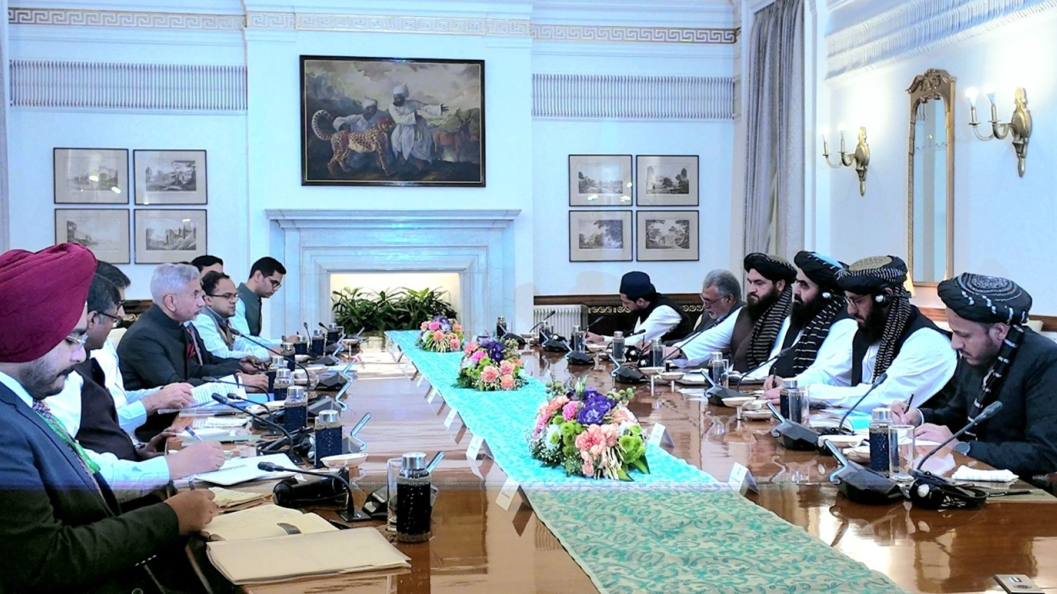Aliyev highlights Azerbaijan’s gas exports and renewable ambitions at energy council meeting
Azerbaijan’s President Ilham Aliyev highlighted the country’s expanding gas exports to Europe and its ...

The Indian Ministry of External Affairs announced on Tuesday that it had upgraded its technical mission in Kabul to a full Embassy with immediate effect.
The move follows External Affairs Minister Subrahmanyam Jaishankar’s pledge to upgrade the mission during his 9 October meeting in New Delhi with Afghan Foreign Minister Amir Khan Muttaqi.
A statement released by the Ministry of External Affairs stated, “In keeping with the decision announced during the recent visit of the Afghan Foreign Minister to India, the Government is restoring the status of the Technical Mission of India in Kabul to that of Embassy of India in Afghanistan with immediate effect.”
The statement said, “The Embassy of India in Kabul will further augment India’s contribution to Afghanistan’s comprehensive development, humanitarian assistance, and capacity-building initiatives, in keeping with the priorities and aspirations of Afghan society.”
Since the Taliban’s return to power in 2021, India has maintained only a “technical mission” in Kabul, focused on humanitarian and development efforts.
The upgrade comes at a very sensitive period amid escalating tension between Afghanistan and Pakistan. For more than a week, Afghan and Pakistani security forces have exchanged heavy fire along their border. These intense clashes have resulted in hundreds of civilian casualties, with many lives lost on both sides.
Over the weekend, Afghanistan and Pakistan signed a ceasefire agreement in Doha, with Qatar and Türkiye mediating.
However, the situation on the border between the two countries remains delicate. The second round of talks between the two nations is scheduled for 25 October in Istanbul.
Pakistan remains intensely sensitive to Indian involvement in Afghanistan and will be vigilantly observing the new developments.
According to analysts from the International Crisis Group, New Delhi’s latest actions could reshape and potentially complicate the regional balance of power.
U.S. President Donald Trump said the U.S. military has enough stockpiled weapons to fight wars "forever"; in a social media post late on Monday. The remarks came hours before conflict in Iran and the Middle East entered its fourth day.
U.S. first lady, Melania Trump chaired a UN Security Council meeting on children and education in conflict on Monday (2 March), a move criticised by Iran as hypocritical following U.S. and Israeli strikes that triggered a UN warning about risks to children.
China’s Foreign Minister Wang Yi has held talks with his Russian counterpart Sergei Lavrov following recent military strikes carried out by the United States and Israel on targets in Iran, as tensions in the Middle East continue to rise.
A torpedo from a U.S. submarine has sunk an Iranian warship off the coast of Sri Lanka, U.s. Secretary of Defense, Pete Hegseth told reporters. The Sri Lankan navy carried out a rescue operation for dozens of sailors in the wake of the strike.
The U.S. embassy in Riyadh was hit by two drones resulting in a limited fire and some material damage, the kingdom's defence ministry said in a post on X on Tuesday, citing an initial assessment.
Start your day informed with AnewZ Morning Brief. Here are the top news stories for the 4th of February, covering the latest developments you need to know.
Strikes across the Middle East are intensifying, fuelling travel disruption, driving up global energy prices and forcing diplomatic missions to shut their doors.
U.S. President Donald Trump has said the United States has a “virtually unlimited supply” of munitions and is capable of sustaining military action indefinitely, as the conflict with Iran entered its fourth day.
The United Nations has called for an investigation into a deadly attack on a girls’ primary school in Iran, which Iranian officials say has killed more than 100 children. The U.S. has said its forces “would not” deliberately target a school.
U.S. first lady, Melania Trump chaired a UN Security Council meeting on children and education in conflict on Monday (2 March), a move criticised by Iran as hypocritical following U.S. and Israeli strikes that triggered a UN warning about risks to children.
You can download the AnewZ application from Play Store and the App Store.

What is your opinion on this topic?
Leave the first comment